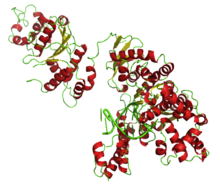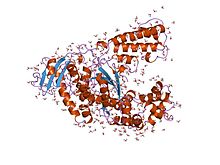Taq DNA polymerase
| Taq polymerase, exonuclease | |||||||||
|---|---|---|---|---|---|---|---|---|---|

DNA polymerase bound to a DNA octamer
|
|||||||||
| Identifiers | |||||||||
| Symbol | Taq-exonuc | ||||||||
| Pfam | PF09281 | ||||||||
| InterPro | IPR015361 | ||||||||
| SCOP | 1qtm | ||||||||
| SUPERFAMILY | 1qtm | ||||||||
|
|||||||||
| Available protein structures: | |
|---|---|
| Pfam | structures |
| PDB | RCSB PDB; PDBe; PDBj |
| PDBsum | structure summary |
| Taq-exonuc | |||||||||
|---|---|---|---|---|---|---|---|---|---|

dna polymerase
|
|||||||||
| Identifiers | |||||||||
| Symbol | Taq-exonuc | ||||||||
| Pfam | PF09281 | ||||||||
| InterPro | IPR015361 | ||||||||
| SCOP | 1qtm | ||||||||
| SUPERFAMILY | 1qtm | ||||||||
|
|||||||||
| Available protein structures: | |
|---|---|
| Pfam | structures |
| PDB | RCSB PDB; PDBe; PDBj |
| PDBsum | structure summary |
Taq polymerase /ˌtæk ˈpɒlᵻməreɪz/ is a thermostable DNA polymerase named after the thermophilic bacterium Thermus aquaticus from which it was originally isolated by Chien et al. in 1976. Its name is often abbreviated to Taq Pol or simply Taq. It is frequently used in the polymerase chain reaction (PCR), a method for greatly amplifying the quantity of short segments of DNA.
T. aquaticus is a bacterium that lives in hot springs and hydrothermal vents, and Taq polymerase was identified as an enzyme able to withstand the protein-denaturing conditions (high temperature) required during PCR. Therefore, it replaced the DNA polymerase from E. coli originally used in PCR.Taq's optimum temperature for activity is 75–80 °C, with a half-life of greater than 2 hours at 92.5 °C, 40 minutes at 95 °C and 9 minutes at 97.5 °C, and can replicate a 1000 base pair strand of DNA in less than 10 seconds at 72 °C.
One of Taq's drawbacks is its lack of 3' to 5' exonuclease proofreading activity resulting in relatively low replication fidelity. Originally its error rate was measured at about 1 in 9,000 nucleotides. The remaining two domains act in coordination, via coupled domain motion. Some thermostable DNA polymerases have been isolated from other thermophilic bacteria and archaea, such as Pfu DNA polymerase, possessing a proofreading activity, and are being used instead of (or in combination with) Taq for high-fidelity amplification.
...
Wikipedia
